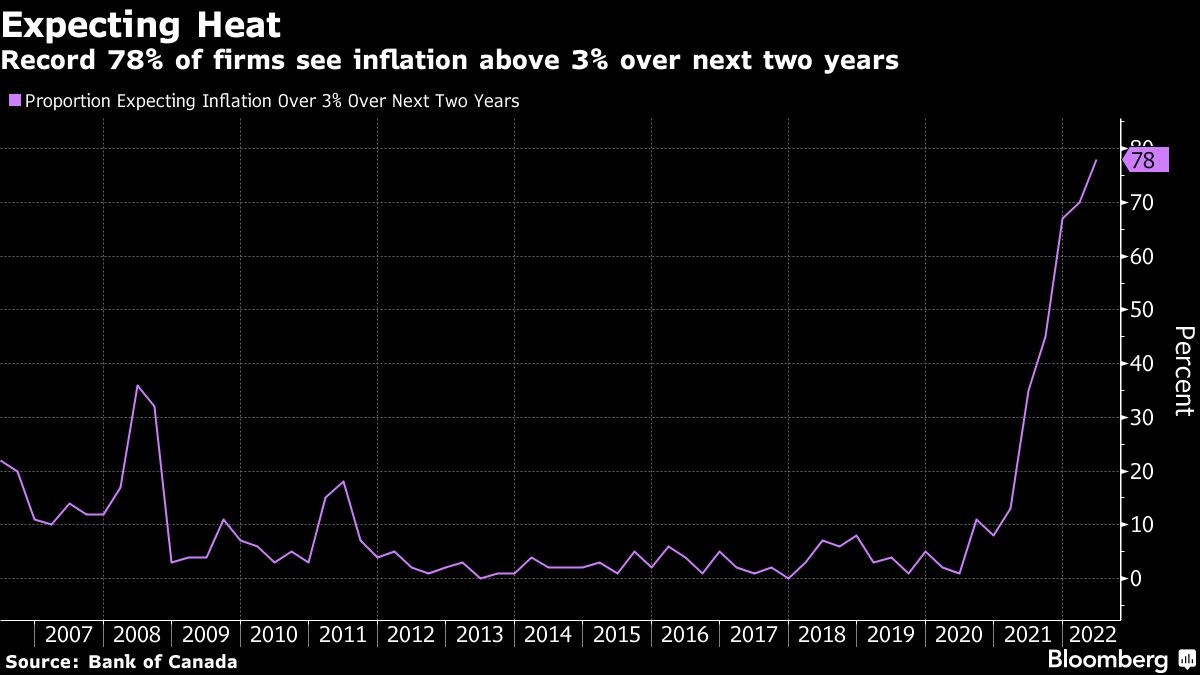Jul 4, 2022
Inflation expectations hit record in Bank of Canada surveys
, Bloomberg News
Inflation expectations hit record: BoC
Inflation expectations over the next couple of years have hit at a record in Canada, a worrying development that will stoke bets of more aggressive interest rate hikes.
The Bank of Canada’s quarterly surveys of executives and consumers released on Monday show the price pressures that have brought inflation to four-decade highs are expected to persist for longer than previously thought, as the country faces tight labor markets and companies get hit by rising input costs.
The reports -- which also show continued evidence that businesses are facing unprecedented challenges meeting demand -- illustrate the urgency for Governor Tiff Macklem to quickly withdraw stimulus from an overheating economy amid concerns that inflation is becoming entrenched.
Markets are almost fully pricing in a 75 basis hike at the central bank’s July 13 decision, bringing the policy rate to 2.25 per cent. The bank is expected to raise it to as much as 3.5 per cent by the end of this year. The benchmark was as low as 0.25 per cent in March.
The Canadian dollar was little changed on the report, trading 0.2 per cent higher at $1.2879 per U.S. dollar at 12:13 p.m. in Ottawa. Yields on Canadian two-year bonds pared losses, down 1 basis point to 3.08 per cent.
“The Bank of Canada is concerned that longer-run inflation expectations could come unhinged,” Nathan Janzen, assistant chief economist at Royal Bank of Canada, said in a report to investors. “To prevent that outcome, moving rates higher from still-low levels currently is an easy call to make.”
On a positive note, the central bank said there’s still confidence that the Bank of Canada can achieve its 2 per cent inflation target and that price pressures will eventually ease.

Consumer expectations for price increases rose across all time horizons, with households seeing inflation at 6.8 per cent in one year and 5 per cent in two years. Both are records.
The five-year inflation expectation also increased significantly to 4 per cent, but still remains slightly below pre-pandemic levels.
The business survey found about 78 per cent of firms expect inflation to exceed 3 per cent over the next two years, also easily a record.
Expected price gains are a key determinant of actual inflation. Businesses increase prices and workers seek pay raises in part on what they anticipate costs will look like going forward.
In addition to rising inflation expectations, the business survey of executives paints a picture of an economy still pressed up against its limits. While businesses expect sales growth to slow, demand conditions remain strong with firms constrained by lack of workers and supply chain bottlenecks, “suggesting that supply is not keeping up with demand.”
Businesses anticipate “significant” wage and price increases, according to the report, with supply chain bottlenecks now expected to persist for longer. Investment intentions and hiring remain elevated, but so are expected wage costs. The average expected wage increase is now at 5.8 per cent next year, according to the business survey, a record.
The central bank also raised the risk that consumer spending could be hit by higher inflation, with confidence down and with households not expecting wage gains to keep up with inflation.
“Expectations for higher inflation and rising interest rates are affecting consumer confidence,” the Bank of Canada said. “In response to such factors, Canadians plan to cut spending. They are seeking out more-affordable options when shopping.”
The broad gauge of business sentiment fell slightly but remains at historically elevated levels. The central bank’s composite indicator of business conditions fell to 4.85, from 5.01.
Still, the Bank of Canada said that uncertainty around the economic outlook has increased over the past three months.
“Most firms saw this uncertainty as creating risks to their outlook but not yet further affecting their operations or sales expectations,” it said.


